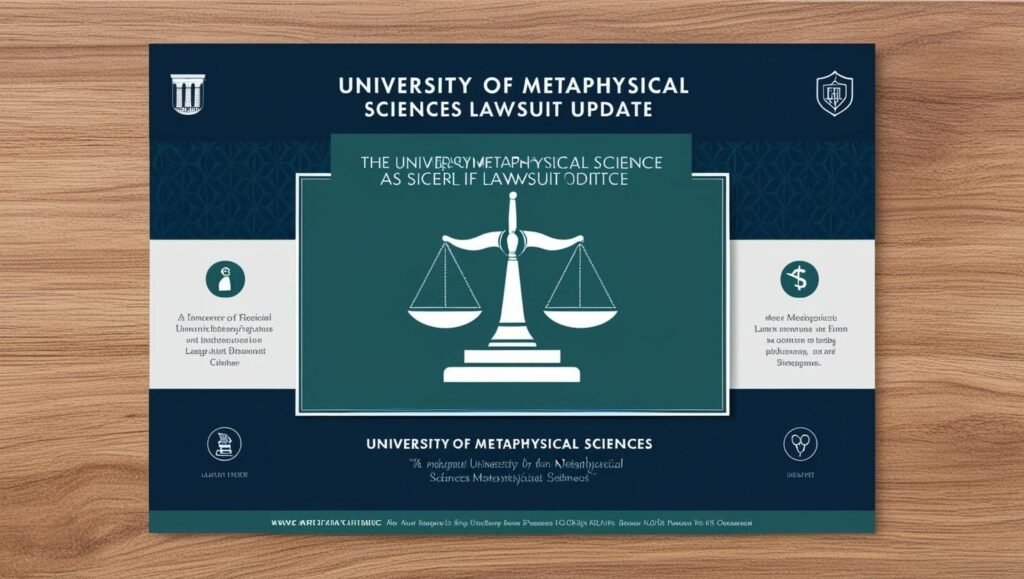The University of Metaphysical Sciences (UMS) has gained national attention due to its connections with members of the spiritual community; however, this nearly decade-long court battle has caught the attention of both the spiritual community and privileged society. Allegations for the University of Metaphysical Sciences lawsuit revolve around unfair competition, as well as trademark infringement and illegal business practices. In this article, we have summarized the latest update on the lawsuit including its status, implications and details of the ongoing proceedings.
The Story Behind the UMS Lawsuit
Timeline of Key Events
| Date | Event |
| June 10, 2019 | UMS resolved a trademark dispute with another institution (IMM) through a settlement agreement. |
| October 14, 2021 | A new lawsuit was filed against UMS, alleging violations of the 2019 settlement terms. |
| December 12, 2022 | The trademark for “University of Metaphysics” faced a legal challenge, further complicating the dispute. |
| June 16-20, 2025 | The trial is set to take place in the U.S. District Court (Northern District of California). |
The legal dispute arose over a disagreement between UMS and another metaphysical education provider, IMM. IMM alleges that UMS unfairly used its trademarked name to promote its programs, thus potentially confusing students. As this UMS lawsuit update continues, it has given rise to serious issues over the operation of UMS and the effect it could have on students as well as the metaphysical education sector.
Understand the Allegations Against UMS
An update to the University of Metaphysical Sciences lawsuit presents all the latest details about this complex set of allegations.
The plaintiff in this case is International Metaphysical Ministry (“IMM”), which claims that UMS infringes its trademark.
It alleges UMS has wrongfully used IMM’s registered names and materials in its marketing of its courses, which it claims “deceives” students.
IMM alleges that UMS has engaged in unfair competition and improper business practices, and that as a result of UMS’s wrongful conduct, IMM’s reputation and business have suffered.
The plaintiff asserts that filing the Drive Social Media Lawsuit is a necessary step to protect its intellectual property rights and uphold ethical standards in metaphysical education.
The plaintiff believes that bringing the lawsuit is a reasonable step to preserve its intellectual property rights and ensure ethical practices in the field of metaphysical education.
UMS, for its part, has promptly rejected the allegations, claiming that its actions are baseless and fall within a broader strategy to discredit the company.
UMS claims that it has always acted transparently and ethically, with the best interests of its students in mind.
To this day, the updated case of the University of Metaphysical Sciences lawsuit remains a subject of lively interest, as both sides remain firm in their beliefs.
Legal Proceedings and University of Metaphysical Sciences Lawsuit Update
Current Status of the Lawsuit
- The case of UMS vs. International Metaphysical Ministry (IMM) is still ongoing.
- The case will be heard in June 2025 in the U.S. District Court (Northern District of California).
Main Allegations
- IMM says it has also accused UMS of trademark infringement, alleging that UMS has used IMM’s trademarked names without proper authorization.
- They have also alleged unfair competition and unethical business practices.
UMC’s Defense
- UMS has denied any wrongdoing and says the claims are baseless and part of a targeted campaign to tarnish its reputation.
- The institution says it has always followed ethical behavior and legal propriety.
Impact on Students and Alumni
- There have been concerns that UMS’ degrees are not legitimate and questions have also been raised about the institution’s standing.
- UMS has assured students that their programs and University of Metaphysical Sciences accreditation are legitimate and recognized.
Financial and legal costs
- IMM has reportedly spent over $1.5 million in legal expenses along with student tuition fees.
- UMS has been able to keep its legal fees low and manage a strong defense.
Broader implications
- The lawsuit has reignited discussions about the legitimacy of metaphysical schooling and calls for stricter standards of accreditation.
- The outcome could shape the way similar institutions operate going forward.
What happens next?
- The 2025 lawsuit will be a pivotal moment for both sides.
- While the case continues to shape opinions about UMS and its place in metaphysical education.

Public Perception and Support for UMS
The ongoing lawsuit has sparked intense discussions within the metaphysical education community, bringing Metaphysical sciences legal issues into the spotlight. Many UMS supporters believe that the legal action by IMM is a strategic move to eliminate competition and discredit a respected institution through unproven allegations. These advocates have voiced their concerns on social media and online platforms, with some warning that IMM’s actions could harm the reputation of the entire metaphysical education field.
Eyeing all of these, IMM supporters claim the lawsuit is essential to safeguard intellectual property rights and maintain two principles guaranteed by almost every country’s Constitution — fair practices and justice. They claim they are protecting trademarks and business practices that they see as crucial to the metaphysical education sector.
The case has also led to questions raised about the University of Metaphysical Sciences fraud allegations, however, UMS has continued to maintain that they have done nothing wrong. The UMS accreditation lawsuit has also taken center stage where stakeholders weigh concerns about its influence on the institution’s credibility or the legitimacy of its programs.
The divide in public opinion highlights the broader implications of the lawsuit, which not only engages UMS and IMM, but also could potentially reshape the future of metaphysical education.
Expert Opinions and Analysis
Legal experts, educators, and industry analysts are paying close attention and the University of Metaphysical Sciences lawsuit update . Many legal professionals have reflected on the case, noting the trademark law issues involved and the difficulties of proving allegations such as University of Metaphysical Sciences fraud. Some experts say the verdict on the case could guide how to resolve intellectual property conflicts in the spiritual education sector in the future. In contrast, professionals and institutions involved in spiritual education have denounced the lawsuit against UMS as damaging to the image of courses catering to the sector.
They emphasize the need for ethical standards and transparency to preserve the credibility of the sector. Spiritual institutions may find new direction Although the outcome of the lawsuit is likely to be complex (for example, the amount of damages to be awarded could be enormous), many analysts believe its final verdict could forever change the landscape of spiritual institutions by reshaping their approach to accreditation and other compliance measures in the years to come; How these legal and ethical challenges will become invisible – and how these challenges will transform education at UMS and the future of spiritual education as a whole.

